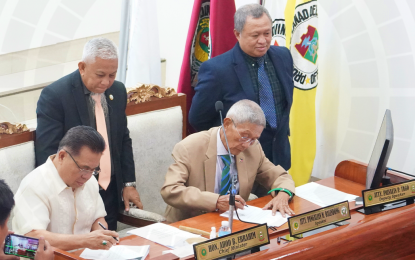
PARLIAMENTARY DISTRICTS. Bangsamoro Autonomous Region in Muslim Mindanao Chief Minister Ahod Ebrahim and Bangsamoro Transition Authority (BTA) Speaker Pangalian Balindong during the ceremonial signing of the Bangsamoro Autonomy Act No. 58, or an “Act Providing for the Creation of Parliamentary Districts in BARMM” in Cotabato City. The bill was signed an hour after the regional lawmaking body approved it on third and final reading Wednesday night (Feb. 28, 2024). (Photo courtesy of BTA-BARMM)
COTABATO CITY – Bangsamoro Autonomous Region in Muslim Mindanao (BARMM) Chief Minister Ahod Ebrahim signed into law Wednesday night a bill creating parliamentary districts in the region.
Ebrahim and Bangsamoro Transition Authority (BTA) Speaker Pangalian Balindong led the ceremonial signing of the Bangsamoro Autonomy Act (BAA) No. 58 or an “Act Providing for the Creation of Parliamentary Districts in BARMM” shortly after the BTA, the regional lawmaking body, approved on third and final reading the measure.
“Thank you very much for working hard and working on time; you were able to pass this very important bill,” Ebrahim told parliament members who readily applauded.
With 47 votes in favor, one no vote, and three abstentions, the Act provides for the formal creation of the parliamentary districts in the region.
In a statement, the BTA media office said the newly enacted law will serve as the foundational framework for the delineation of the parliamentary districts, aimed at ensuring fair representation for the diverse needs and concerns of the Bangsamoro people.
During public consultations on the bill, local leaders and sector representatives in BARMM’s six provinces, three cities, and the special geographic area have asked lawmakers to add at least one more district each for more representation in the regional body.
However, the original bill that sought the creation of 32 single-member parliament districts prevailed.
The law allows three district representatives to the parliament from Basilan, seven in Sulu, three in Tawi-Tawi, four each in Maguindanao del Norte and del Sur, eight in Lanao del Sur, two in Cotabato City, and one in the Special Geographic Area.
The apportionment of parliamentary districts is based on both population and geographical area, with each district consisting of contiguous, compact, and adjacent areas with a minimum population of 100,000.
Ebrahim reiterated the importance of fair representation, acknowledging the distinct requirements of the Bangsamoro people.
Balindong, a lawyer, supported Ebrahim saying that the creation of 32 single-member parliamentary districts is a bold step toward addressing constituents’ concerns with precision and fairness.
BARMM, comprising six provinces, three cities, 116 municipalities, and 2,590 barangays, is home to over four million residents.
As outlined in the Bangsamoro Electoral Code, the parliament will consist of 80 members, with 40 seats for party representatives, 32 seats for district representatives, and eight seats for sectoral representatives, each serving a maximum of three years per term.
District representatives will be elected in the 2025 midterm elections through majority votes, requiring voters to be registered in the respective district.
Individuals who wish to become district representatives must fulfill certain criteria, including registering to vote in the district and having lived in the same area for at least one year. (PNA)
